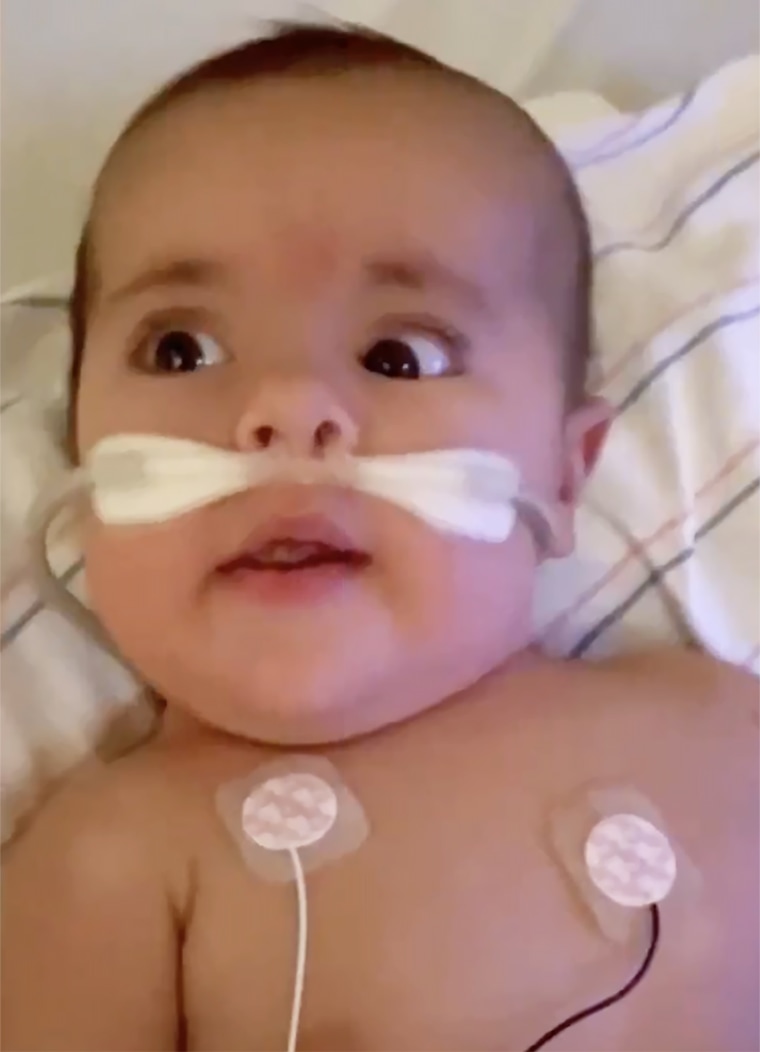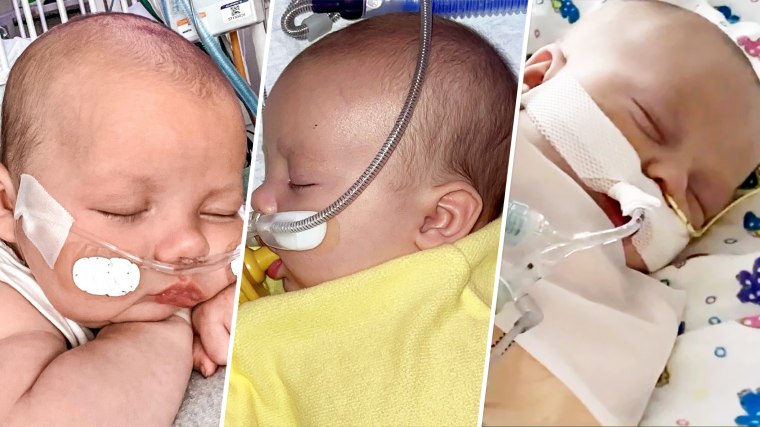Bill and Sarah Vacca of Albany, New York, were about to drop their 4-month-old daughter off at day care when they noticed that her breathing appeared labored earlier this month.
“Her chest was doing a lot of up and down,” Bill Vacca told TODAY. A quick video call with their pediatrician validated the couple’s concern: “You definitely need to go to the emergency room right now,” they were told. After rushing their baby to the hospital, they learned their little girl had respiratory syncytial virus, or RSV.

RSV infects the body’s respiratory system and causes cold-like symptoms in most people but can make it very difficult for babies and young children to breathe. The virus can cause inflammation of the throat, lethargy, radically diminished energy, and low oxygen levels that can become life-threatening. The congestion that accompanies RSV also affects a baby’s ability to eat. The Centers for Disease Control and Prevention estimate around 58,000 U.S. children under 5 are hospitalized with RSV every year, resulting in around 500 U.S. deaths, though some estimates are much higher.
During their four harrowing days in the hospital before their baby was allowed to return home, the Vaccas witnesses many of the typical interventions doctors provide for babies battling RSV: fluids administered intravenously to help with hydration, deep suction to clear out nasal and throat passageways, and external oxygen to assist with breathing.

“We were definitely terrified,” Bill Vacca said. “Especially when we saw that she needed to go on oxygen and had the tubes in her nose and all the hoses hooked up to her.” The Vaccas recalled a moment when they were standing nearby their child, crying together: “(We) couldn’t believe that this was happening,” they said.
Unfortunately, experiences like theirs aren’t rare this RSV season.
“We’re seeing an explosion of RSV cases unlike anything we’ve had,” Dr. Phoebe Yager, the medical director of the pediatric intensive care unit at Mass General for Children, told TODAY.
Dr. Andrew Pavia, a pediatric infectious disease epidemiologist at Intermountain Primary Children’s Hospital in Salt Lake City, agreed. “RSV has arrived much earlier than is usual, and the numbers of cases are increasing very rapidly,” he told TODAY. “In parts of the U.S., the numbers of hospitalized children are already similar to what we would typically see around mid to late December, and are still increasing.”
Why RSV is so bad this year
RSV is nothing new — “It’s been around forever,” Yager said — but this RSV season is unique for a few reasons. One is because immunity against the virus has waned with fewer infections during the winters of 2020 and 2021. Another explanation is a change in human behavior.
“The past two years, people were still social distancing and masking, which made the first RSV season of the pandemic virtually nonexistent and last year’s significantly diminished,” Yager said. “But now that kids are back in school and many people have abandoned preventive health measures, RSV cases are blowing up again.”
Dr. Nipunie Rajapakse, a pediatric infectious diseases physician at Mayo Clinic, Rochester, offered a similar take: “Many of these young children have been relatively protected from many infections by the measures put in place to prevent the spread of COVID-19, such as masking and physical distancing, so they have not developed immunity to viruses like RSV yet.”
Matters have been made worse this year by several viruses slamming hospitals all at once. “RSV cases are hitting at a time when we are already dealing with COVID-19, the flu, and the return of enterovirus D68,” Dr. Elizabeth Murray, a pediatric emergency physician at the University of Rochester Medical Center, told TODAY. “It’s the perfect storm of four very contagious germs that can make children very ill.”
What’s more, Pavia said that many hospitals have lost a lot of staff since the pandemic began, “including some of our most experienced intensive care nurses,” and the coronavirus’s continued presence means fewer intensive care unit beds are available to handle the RSV wave. “Despite the misperception that COVID is over, COVID infections among hospital staff continues to exacerbate staffing shortages and also leads to a significant number of children being hospitalized,” Pavia added.
RSV symptoms in adults versus babies
One of the reasons RSV is so dangerous for babies is it’s “notorious for causing a lot of mucus and congestion,” explained Murray. That congestion can be expelled by older kids or adults by blowing their nose but is not as easily cleared by babies.
“Smaller bodies mean smaller pathways for breathing,” Yager said. And when those smaller pathways become inflamed by the virus, it can become life-threatening.
RSV symptoms are often exacerbated when congested babies don’t eat as well — or sometimes at all.
“Nursing babies need to breathe through their nose. Trying to breastfeed or take a bottle when you are having trouble breathing through your nose is frustrating and often leads to the littlest patients having a tough time taking in enough liquids,” Murray said.
As bad as RSV is for babies, it generally isn’t concerning in healthy adults. “In older children, young adults and even some younger children, RSV can look just like the common cold,” Pavia explained. Beyond the larger size of their passageways and ability to expel congestion, adults also build up immunity to RSV over time.
“We are all infected with RSV many times during our lifetime. With increasing exposure, we develop immunity, which makes it a much milder illness,” added Pavia.
Even still, immunocompromised older children, or ones with chronic breathing issues such as asthma, are often still affected dramatically by any respiratory virus, including RSV. The elderly are also uniquely vulnerable. “In older adults, RSV can cause pneumonia, worsening of heart failure and worsening of lung disease,” Pavia said. An estimated 177,000 adults over 65 are hospitalized as a result of RSV every year, contributing to some 14,000 deaths.
When to take a baby with RSV to the hospital
Though concerning in many children, “most children with RSV will do just fine at home,” Pavia explained. Getting plenty of rest, nasal suctioning or flushing, and drinking a lot of liquids will help most kids beat RSV from the comfort of their own bed. But when certain symptoms persist or increase, it may be time to visit the doctor.
“It’s initially impossible for parents to distinguish which virus a child may have and whether it’s a common cold or something more serious,” Yager told TODAY. But if your child is wheezing or seems to be struggling to breathe, a trip to the pediatrician is in order.
RELATED: How to tell if your kid has a cold, the flu, RSV or COVID-19
“When you notice that the skin around your child’s ribs sucks in with each breath or if they seem to have trouble speaking or don’t want to speak because of their trouble breathing, it’s time to seek care emergently,” Murray said. “Little babies will often grunt with each breath when they are having trouble.”
Another thing to look out for in babies is a diminished number of wet diapers, as that can be a sign of dehydration. Increased or persistent lethargy is also cause for concern. “If a child is very lethargic or difficult to wake, they should be evaluated right away,” Rajapakse said.
Worse of all, “any tinge of blue around the lips means oxygen is severely compromised, which is life-threatening. 911 should be called immediately,” Yager warned.
Tips for prevention
One advantage of fighting a virus that’s been around as long as RSV is that doctors fully understand how it’s transmitted.
“RSV is primarily transmitted through water droplets that leave a sick person when speaking, coughing or sneezing, which then land on surfaces,” Yager explained. Those droplets stay on surfaces where the virus remains active “for many hours,” and are then “transmitted to others when that surface is touched and the person then touches their mouth, nose or eyes,” Yager continued. So, she advised: “Proper hand hygiene is your best defense against RSV.”
Pavia also recommended washing hands often and not touching one’s face, along with avoiding close contact with people who are sick, keeping young children away from anyone with cold symptoms, and practicing preventive health measures. “Masking, especially by the person with symptoms, can decrease transmission,” he said.
“It is also critical that children and adults who are ill with any illness stay home when they are sick,” Murray advised.
Rajapakse agreed: “I would strongly encourage anyone with any respiratory symptoms like a runny nose, cough, or sore throat to avoid visiting or coming in close contact with young children, especially those under 6 months old. RSV can feel just like a mild cold for an older child or adult but can cause a life-threatening illness for a newborn or young infant."
Keeping your newborn home as much as possible "with few visitors" is another solution, said Dr. Elizabeth Mack, the head of the pediatric critical care unit at the Medical University of South Carolina.
Yager stressed that older children and adults can also be helpful by preventing themselves from needing to go to the hospital, as many places are already seeing a shortage of ICU beds. She advised eligible children and adults to get vaccinated against COVID-19 and the flu to prevent another winter surge from overwhelming local and national healthcare systems.
“Flu season is about to begin on top of COVID and an already exploding RSV season,” she warned. “If we fill our beds and exhaust our resources for people that could have stayed out of the hospital altogether, things are only going to get worse this winter.”
